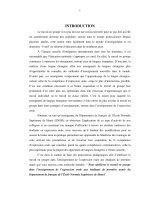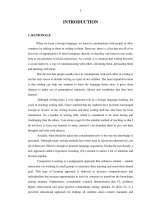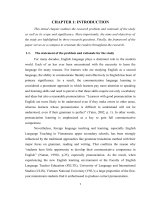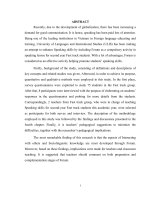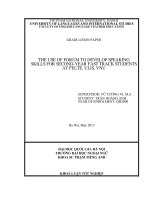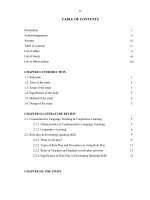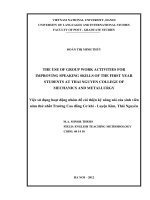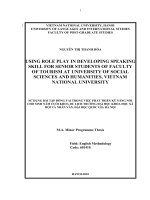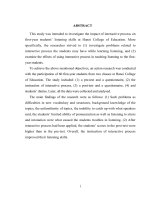NGHIÊN cứu VIỆC sử DỤNG HÌNH THỨC DIỄN đàn để TĂNG CƯỜNG kỹ NĂNG nói CHO SINH VIÊN CLC năm 2 tại KHOA sư PHẠM TIẾNG ANH, ĐHNN, ĐHQGHN
Bạn đang xem bản rút gọn của tài liệu. Xem và tải ngay bản đầy đủ của tài liệu tại đây (1022.01 KB, 93 trang )
ABSTRACT
Recently, due to the development of globalization, there has been increasing a
demand for good communication. It is hence, speaking has been paid lots of attention.
Being one of the leading institutions in Vietnam in Foreign language educating and
training, University of Languages and International Studies (ULIS) has been making
an attempt to enhance Speaking skills by including Forum as a compulsory activity in
speaking lesson for second year Fast track students. With a lot of advantages, Forum is
considered as an effective activity helping promote students’ speaking skills.
Firstly, background of the study, consisting of definitions and descriptions of
key concepts and related studies was given. Afterward, in order to achieve its purpose,
quantitative and qualitative methods were employed in this study. In the first place,
survey questionnaires were exploited to study 75 students in the Fast track group.
After that, 8 participants were interviewed with the purpose of elaborating on students’
responses in the questionnaires and probing for more details from the students.
Correspondingly, 2 teachers from Fast track group, who were in charge of teaching
Speaking skills for second-year Fast track students this academic year, were selected
as participants for both survey and interview. The description of the methodology
employed in this study was followed by the findings and discussions presented in the
fourth chapter. Finally, it is teachers’ pedagogical suggestions to minimize the
difficulties, together with the researcher’s pedagogical implications.
The most remarkable finding of this research is that the aspects of Interacting
with others and Sociolinguistic knowledge are most developed through Forum.
Moreover, based on these findings, implications were made for teachers and classroom
teaching. It is suggested that teachers should comment on both preparation and
complementation stages of Forum.
i
LIST OF ABBREVIATIONS
CLT Communicative Language Teaching
FELTE Faculty of English Language Teacher Education
L2 Second language
ULIS University of Language and International Studies
VNU Vietnam National University
LIST OF FIGURES& DIAGRAMS
LIST OF FIGURES PAGE
FIGURE 1
Students' attitude towards the importance of
speaking skills compared to the other 3 English
skills
24
FIGURE 2
Students’ attitude towards the effectiveness of
Forum activity in developing speaking skills
26
FIGURE2
Aspects of speaking proficiency Students had
gained (as perceived by themselves)
28
FIGURE3 Facilitators’ difficulties in the facilitation stage 37
FIGURE4 Participants’ difficulties in the facilitation stage 40
LIST OF DIAGRAMS PAGE
DIAGRAM 1
Schematic Representation of Communicative
Competence
10
ii
TABLE OF CONTENTS
ABSTRACT i
LIST OF ABBREVIATIONS ii
LIST OF FIGURES& DIAGRAMS ii
Students' attitude towards the importance of speaking skills compared to the other 3
English skills ii
Students’ attitude towards the effectiveness of Forum activity in developing speaking
skills ii
Aspects of speaking proficiency Students had gained (as perceived by themselves) ii
TABLE OF CONTENTS iv
PART II. DEVELOPMENT 6
CHAPTER 1: LITERATURE REVIEW 6
CHAPTER 2: METHODOLOGY 19
2.1.1. Students 19
2.1.2.Teachers 19
2.2.Data collection instruments 21
2.2.1.Questionnaire 21
2.2.2.Interview 24
2.3.2.Interview procedure 26
2.4.Data analysis method 27
Data analysis started with synthesizing the data obtained from the questionnaire and
classifying them to answer the research questions. Responses from close-ended questions
were calculated, transferred into numerical form and summarized into graphs.
Descriptive statistics were employed to display the findings from the survey. On the
other hand, those from open-ended questions were transcribed and categorized by key
words of the statements and used to support answers for 3 research questions 27
iv
Finally, qualitative data collected during the interviews were transcribed and
summarized to be referred to when data analysis was illustrated 27
Summary: So far, this chapter has justified the methodology applied in this paper by
elaborating the setting and two groups of participants involved the process of data
collection. Furthermore, the combination of two data collection instruments was also
clarified. These justifications of the methodology would help make the way for the
findings and discussion in the next chapter 27
CHAPTER 3: RESULTS AND DISCUSSION 28
In this chapter, all the data collected from the questionnaire and interview will be
revealed and discussed in detail. This chapter will present and discuss results and
implications. More specifically, data collected from two different methods will be
integrated to support and complement each other all in the forms of answers to the four
research questions. It is noteworthy that the connection between these findings and
other related studies in the literature will also be discovered to underline the similarities
as well as the new findings on the research topic 28
3.1.Background of students’ attitudes towards speaking skills and Forum activity. 28
Though the answers of the first five questions in the questionnaire do not directly
answer the research questions, they help support the rationale of the study 28
28
Figure 1.Students' attitude towards the importance of speaking skills compared to the
other 3 English skills 28
Answering the first question, 53% of the number of participants rated speaking as the
most important English skill which should be mastered 28
Explaining this, interviewee C said that: 28
[…] because I think speaking is has a great influence on the other skills, especially
listening. Only when you have master speaking can you have a good job in listening.
Besides, all the vocabulary as well as grammar are derived from speaking. And the last
reason is that when learning a foreign language, people often try their best in learning
v
how to communicate with other people, and speaking is the most targeted skill […]
(Interviewee C, March 23, 2013) 28
It can be seen that students were well aware of the importance of speaking skills,
especially under CLT context. The other 47% number of participants agreed that
speaking was as important as the other three skills. After the interview session, there
was one reason for this issue was that each of the four English skills supports each other.
Thus, “we should develop speaking as well as the other 3 equally skills to have full
comprehension of any foreign language.” (Interviewee E, 2013) 29
By the time the research was conducted, all of the participants had already participated
in 4 to 6 Forums and moreover, all of them had chance to be both facilitators
(moderators) and participants. This statistic considerably support the validity of the
research as those participants would provide the data in all sides 29
After conducting Forum activities for at least 4 times, four fifths of the participants
agreed that Forum activity was interesting, which accounts for a large scale 29
Talking about in which way participants found Forum was an interesting activity, 7 out
of eight interviewees claimed that the first reason was compelling topics, which are not
only close to their daily life but also hot issues such as Facebook, homosexuality,
cosmetic surgery, etc. Moreover, since in each Forum, each group of students had their
own role, they had chance to debate the hot issue in different perspective of their
assigned roles, not from their own ones (Interviewee D, 2013) 29
There are still 16.4 percent of the participants who found Forum not interesting.
Interviewee C agreed that though Forum still has good side as the topics are stimulus,
questions raised in some Forums were too general and a few facilitators seemed to
highly control participants when they were supposed to encourage the participants to
speak 30
The chart below shows students’ attitude towards the effectiveness of Forum in
developing speaking skills 30
30
vi
Figure 2. Students’ attitude towards the effectiveness of Forum activity in developing
speaking skills 30
It can be seen from the chart, more than 80% of the students answered that this activity
is effective 30
According to 8 interviewees, Forum was effective in developing speaking skills as it
offered chances to broaden background knowledge about hot issues, enlarge vocabulary
in many aspects in life. It is because, in each Forum students would pick up a topic
related to any aspect of social life, from environment to political. Moreover, as everyone
in Forum are supposed to raise their voices, especially participants, the interviewee said
that they had to think quickly and critically in order to find convincing ideas to speak.
In this case, interviewee H even emphasized that “During this process, your mind works
continuously and you would totally speak out without thinking twice because you’re in a
hurry, an urge to say.” Lastly, the interviewees claimed that Forum could increase their
confidence while speaking as they had to speak in front of lots of people for several
times 30
3.2.Research question 1: Which aspect of speaking proficiency under the
communicative approach can 2nd -year Fast track students gain through Forum
activity as perceived by students themselves 31
What the students have gained through Forum activity will be continuously revealed in
question 6. The following charts clearly show what aspects of speaking proficiency the
2nd-year students at Fast track group had gained 31
32
Figure 3. Aspects of speaking proficiency Students had gained (as perceived by
themselves) 32
It can be seen from the table charts that 2nd-year students taking part in the survey
could gain all 8 aspects of speaking proficiency. Nevertheless, the proportion of each
aspect differs from each other 32
vii
From the chart, 80% of the students claimed that they had improved the ability of
interacting with others through Forum activity. This number ranks the first and
accounts for a large proportion. In the interview session, interviewee D shared that
during the Forum “it was important to know the right time to support or interrupt
others.” According to her and the other interviewee, no one should dominant the Forum.
Each person should listen to others first as well as know where to stop in order to give
others the chance to speak. This sharing somehow strengthened the theory about the
aspect of Interacting with others provided by To et al (2012). According to the authors,
Interacting with others refer more to speakers’ cooperation while speaking, specifically
the ability of yielding speaking turns as well as provide others the chance to interrupt.
This is also similar to Brown (1994), Mead & Nancy (1985)’s speaking definition: an
interactive process where each individual alternatively take the role of speakers and
listeners. It is, thus, interacting with others can be considered a core factor to have a
successful communication. Interestingly, students seemed to be well aware of this and
they have gained this speaking aspect the most through Forum 32
Interviewee F said that “…I found that my ability to interact with others was improved
a lot. I knew how to ask them to express their ideas as well as sometimes stop their ideas
due to misunderstanding the questions.” 33
Following the above aspect is the aspect of Socio-linguistic knowledge accounting for
nearly 60% of total. Socio-linguistic knowledge, as mentioned in Literature review
chapter, is the speaking aspect by when speakers know what comments are appropriate,
how to ask questions during interaction and how to respond nonverbally. Explaining
this point, interviewee simply said that “…By my experience and the structures teacher
gave, I know how to interrupt others politely and effectively when they’re speaking…”
34
It can be inferred that these two students had paid lots of attention to the
professionalism when participating in a Forum. They knew clearly that they did not only
speak out their ideas but also listen to others, evaluate others’ ideas; thus helps them
know what to say and when to say, when to interrupt appropriately and politely. This
supports the definition of “socio-linguistic language” given by To et al (2012) 34
viii
Ranking at the third place is the aspect of “Compensating language” which accounts for
40% of total. According to interviewee A’s sharing, during the Forum, she would
observe her friends together with noticing that some were interested while some were
not. This is thus; she would invite the second ones to speak out their ideas. It could help
everyone create a more comfortable atmosphere and keep the debate on going 34
Interviewee D shared that “When arguing in the forum, I need to make clear my ideas
and arrange them reasonably to be persuasive. Saying something spontaneously without
ordering makes the ideas so confusing and incomprehensible” She further explained
that she normally did not speak out her ideas immediately as it would be funny and
unconvincing. She would find suitable supporting reasons to defend her ideas instead.
This interviewee said that she gained this skill thanks to her teacher and peers’
comments 35
Closely following the previous aspect, also sharing the same percentage namely 38.2%
are “Lexis and grammar”, “Connected speech” and “Language processing” 35
Regarding Lexis and grammar, Interviewee B shared that thanks to her teacher, she
knew more function lists such as introduction, interrupting, asking for a reason, etc.
Thus, she knew which structure for giving an introduction when being a facilitator and
which one would be used when being a participant. She then took an example “…we‘re
moderators and we need to say “We declare to open the forum”. It sounds quite
professional so we’re quite excited about this…”Meanwhile, interviewee A said that
before the real Forum took place, she had practiced presenting ideas by using
presentation language as well as some slangs. The reason for using slang is she wanted to
make her speech more natural and impressive. Furthermore, from the interviewees’
answer it could be drawn out that they preferred impressive structures to capture
others’ attention. They help reinforce the theory of oral expression in Mackey’s point of
view. As mentioned in the previous chapter, Mackey (2011) claims that there is an
involvement of not only right sounds, rhythm or intonation when speaking but also the
choice of words according to its grammatical function in a sentence to convey the right
meaning 35
ix
The next term “connected speech” is defined as assimilation, linking sounds etc. Talking
about this point, interviewee G shared her experience as “Because I always miss it when
speaking. This is the reason why I cannot listen well to native –speaker. When I focus on
them, I certainly have full skills of speaking, not just pronunciation or intonation…” 36
Interviewee F added “I hardly linked sounds together but now I have awareness of
linking sounds and still try to improve more in the near future…” 36
It can be inferred that while speaking, students were well aware of the importance of
linking sounds 36
Next, regarding “Language processing”, when being asked whether the interviews
gained this proficiency by herself from teachers’ or peers’ comments, interviewee G
answered that “…Of course, I receive them from objective views but after that I see and
change myself and decide what I have gained and not and I have to improve what
first…”. Interviewee F, on the other hand, gave an example to illustrate the proficiency
“Language processing” “Well, I can react quickly with my classmates’ questions and
give them a satisfactory answer…” 36
Nevertheless, this example could not be generalized since perhaps interviewee F is good
at speaking so she could react quickly to facilitators’ questions. This might not be true to
others 36
“Expressive devices” proficiency ranked at the 7th place with 36.4% number of
participants chose it. Illustrating this aspect, interviewee A took one example from her
experience: 37
[…] when I was a facilitator or a forum participant I had to defend my ideas and debate
with the other side on their own ones so I had to change my pitch or my stress to express
my feeling and my ideas about the aspects. For example, when I spoke out my own ideas,
I would do that strongly and briefly, but when I just partly agreed or gradually agreed
with my opponent’s ideas, I would repeat the ideas not with all my might, but softly
enough […] (Interviewee A, March 23, 2013) 37
Interviewee C, added: 37
x
[…] I try to listen to my classmates in how they put stress in a word and in sentences to
give the real expression beyond the words or ask them how to do. When I get used to it, I
have no difficulty in understanding others’ ideas as well […] (Interviewee C, March 23,
2013) 37
From these examples, it can be seen that the students clearly knew the importance of
speaking in perfect English. Hence, there was much attention paid on word stress, pitch,
volume as they varied their voice, speed and intonation when speaking to convey not
only the ideas but also their attitudes towards them. This makes the speech livelier and
more persuasive 37
Being chosen by 30.1% number of participant, sharing the lowest proportion it is the
aspect of “Real-time information processing”. This speaking proficiency is defined as the
ability to process the information other tell us at the moment we get it (To et al, 2012).
One typical example illustrating that has been extracted from the interview with
interviewee D: 37
[…] In a forum, students have to speak from the perspective of the assigned role; as a
result, when they get information from the others, they have to instantly associate these
information with their role to give the proper responses. And they do it again and again
during the forum period so I think that it will have some positive effect on their “real –
time information processing […] (Interviewee D, March 24, 2013) 37
Since the feature of Forum in Fast track context is students have to think in their
assigned role’s perspective. Therefore, in a short period of time, they had both processed
the information and found ideas from their roles to speak out. It is not an easy task as
sometimes their role might be teachers, parents and even authorities. Understandably,
they could not have adequate experience with these roles thus could not react quickly
towards other’s ideas and even sometimes, they did not have enough time to consider
what they were going to talk. This is similar to the case of interviewee C when she said
that “when a person talk something bad to you but in the strange and it’s difficult to
understand, but right after that you cannot react anything and still think that there’s
nothing in the saying. The speaker will laugh at you later and assume that you’re a
xi
stupid one…” This is, thus, normally students prepared the ideas in advanced. It is
because if they did not do this, the processing time would have take for too long, which
would surely affect their performance as well as the whole Forum. With such a fact,
students are not aware of “real-time processing”, so this is little gained 37
In sum, from the chart it can be seen that all of the aspects of speaking proficiency were
chosen meaning the students could gain all of them through Forum activity. Among
these 8 aspects, “Interacting with others” earns the highest percentage and outnumbers
the others. This means this skill is gained by most participants. Coming next is “Socio-
linguistic knowledge” with 58.2%. Besides, it is worth noting except for these two above
aspects, that the other six share the statistic in rather at same level, which ranges from
30% to 40% 38
3.3.Research question 2: Which aspect of speaking proficiency under the
communicative approach can 2nd -year Fast track students gain through Forum
activity as perceived by teachers? 38
3.4.Research question 3: What are the difficulties faced by 2nd-year Fast track
students in the facilitation stage in Forum as perceived by themselves? 40
3.4.1.For Facilitators 40
87.3% number of participants agreed that they encountered some difficulties in the
facilitation stage in Forum. The chart below would show more details: 40
41
Figure 4. Facilitators’ difficulties in the facilitation stage 41
As can be seen from the chart, option A was most chosen by facilitators, which means
students faced a lot of difficulties in pronunciation. That is the reason why 5 out of 9
students circled this option. Interestingly, teacher Y did claim pronunciation was the
problem for both participants and moderators. Her students seemed to “struggle” with
pronunciation. Besides, from students’ sharing, the main reason making they
mispronounced words is they had to speak out their ideas quickly when more attention
was paid on the content or meaning of the ideas. Thus pronunciation was somehow
xii
disregarded. Interviewee B shared that “During a forum, we need to act immediately
and sometimes I had some spelling mistakes because I just focus on the content of the
answer. And I see this happens in other classmates as well…” Interviewee E even
pointed out her typical mistake in terms of pronunciation as forgetting adding ending
sounds like /s/, /t/, /d/, etc. Interviewee F, in addition, explains that pronunciation was
her biggest problems as it resulted from her nerve. In interviewee D’s opinion,
mispronouncing also led to another difficulty, which is conveying ideas to participants 41
“… Mispronouncing will make people hard to catch the words. As a result, they cannot
catch the ideas of a presentation… Besides, the misused stress can drive listeners to
wrong directions and they may misunderstand what we mean to say…” 42
For this difficulty, both two teachers said that there was no other way than practicing
pronunciation. Teacher X even claimed that pronunciation would not be commented
much on Forum as pronunciation checking would be done in Presentation activity. In
Forum, she would like to focus on the way of arguing instead. On the contrary, teacher
Y did comment on students’ pronunciation as she realized her students encountered
many difficulties with this. It can be seen that, students’ main problems determined the
way teachers gave feedbacks 42
Following is “Interacting with others” with 52.1% of total. For this aspect, interviewee F
shared that “Sometimes, I feel nervous that I seem to have quite serious attitude when
doing facilitation, which affects to the interacting with participants. It is not really
natural and effective ” Sharing the same experience, interviewee said that “… I was a
moderator and my speaking skills were very poor so that I were nervous and did not do
what I hoped. This is the reason why I could not ask flexibly or professionally…” It
appeared that students were well aware of their weakness in interacting with others.
This helps they try more to have a better performance. Thus, “interacting with others”
is also the aspects of speaking proficiency students gained most as analyzed in the
previous part 42
Interestingly, teacher X, from her interview, had pointed out another difficulty that
facilitators usually faced. According to her, facilitators rather lack of the ability to
xiii
divide the topic into sub topics and this problem somehow made some of the Forum not
well organized and less interesting. Furthermore, due to this, facilitators also could not
control the attendants well, they did not know when to interrupt the participants or they
let the participants speak freely without guidance (Teacher X, 2013). She then provided
the suggestion as topics should be divided into sub topics first together with questions
for each sub topic and followed by being sent to the teachers to receive comments. She
claimed that the groups who sent the questions before hand normally had more
successful Forums than who did not 42
For this difficulty, teacher X also kindly shared some suggestions for students’ better
performance. In terms of Forum organization, one solution is that moderators should
divide the class into appropriate groups or roles. Afterward they need to divide the topic
into different aspects and then propose questions according to each sub topic. They may
send their organization to the teachers for consultancy. Remarkably, according to
teacher X and Y sharing, moderators are highly recommended to send teachers their
materials. Teacher X claimed that “those sent the materials normally had better
performance”. In this case, students need to be independent as responsible for their
work as teachers would not ask them to hand-in 43
3.4.2. For Participants 43
43
Figure 5. Participants’ difficulties in the facilitation in Forum 43
It is clearly seen from the chart that “Expressing ideas clearly and effectively” earns the
highest proportion of all 4 options. To illustrate this point, interviewee A admitted that
sometimes her speaking was lengthy and not clear enough. Additionally, according to
interviewee E, she found it quite difficult to express exactly what she thought when
being a participant. She then explained as she needed much time to choose the words
and sometimes, they do not really express my thoughts effectively 44
Interviewee D, according to her experiences, in some cases it was easier to find the
disadvantages than the advantages but according to the role, she had to say about the
xiv
advantages though she did not want to do it. Interviewee C even shared her experiences
as: 44
[…] When participating in debating part of a forum, I often find it difficult to rack my
mind and find out the ideas that are valuable for protecting our opinions and debate
other opinions. Some ideas are just for fun and of course they are out of topic, or I find
the ideas that oppose to myself […] (Interviewee C, March 23, 2013) 44
Regarding this difficulty, teacher X explained that the main reason was students still
lacked of critical thinking. As critical thinking could not be improved in a short time,
teacher X suggested that teachers should correct students’ mistake in reasoning right
after the Forum as she did. Hence, students will gradually know how to think critically.
44
Owning the second large proportion, which is 66.7%, is the aspect of “Finding valuable
ideas and information which suit your role to speak”. Interviewee D, she found in some
case it was easier to find the disadvantages than the advantages but according to the role
she had to say about the advantages although she did not want to do it. This case is
somehow similar to the case of interviewee H when she said that: 44
It can be inferred that one of the reasons causing this difficulty is the lack of interest in
students’ assigned roles 45
On the other hand, interviewee B claimed that even every participant prepared the
information in advanced, they still encountered difficulties. The main reason is that if
everything is spoken out in a prepared way, the Forum would be boring. Thus creative
ideas were highly recommended. However, as they had to speak in their role’s point of
view, this was not an easy task 45
Talking about the solution for this difficulty, teacher X gave the suggestion that students
should attend some debate club outside the classroom, a debate club at American center,
for example. By this way, students would be more familiar with the way to think
logically, the way to react or response to others’ ideas as well as the way to defense ideas.
Moreover, they would become more confident when giving a speak among a large
number of people 45
xv
In brief, it can be seen that difficulty in pronunciation is most faced by facilitators while
“expressing ideas clearly and effectively” was reported to cause lots of difficulties for
participants during the facilitation stage of Forum activity. Interestingly, both teachers
and students shared the same solution for the problem of pronunciation: this is
practicing. Some students from the interview also claimed that once having good
pronunciation; students would be able to convey their ideas better and would cause less
misunderstanding or confusion when expressing ideas 45
Summary: In this chapter, the findings and discussions of the collected data have been
presented in order to provide answers to each research question. The above findings will
be summarized in the next chapter 45
PART III.CONCLUSION 46
Previous chapters have thoroughly elaborated the introduction, the literature, the
discussions and the results of the research. Finally, this concluding chapter will
summarize and evaluate the outcomes of the whole paper by summing up the findings,
the contributions of the paper, the limitations as well as several suggestions for further
studies 46
1.Summary of the findings 46
Generally speaking, this research has investigated on the use of Forum as a compulsory
activity helping develop speaking skills for 2nd-year Fast track students, Faculty of
English Language Teacher Education, ULIS, VNU 46
First and foremost, the study indicated that speaking skills had great importance and
played a crucial role in helping learners communicate as well as acquire the language
effectively through communicating. Added to this, Forum is corroborated to be an
interesting and effective speaking activity providing useful help for students to develop
their speaking skills 46
Through the in-depth analysis of the data collected from two sets of questionnaires and
interviews, significant findings of the research are summarized as follows 46
xvi
The study has discovered the aspects of speaking proficiency gained by students as
perceived by themselves as well as evaluated by their teachers. Among eight aspects,
Interacting with others, Sociolinguistic knowledge and Compensating language are the
aspects that students gained the most through Forum 46
Moreover, based on students’ opinions and teacher’s evaluations, Pronunciation,
Controlling the Forum, Finding suitable ideas to argue and expressing ideas clearly and
effectively stand out as the most basic difficulties encountered by students while
conducting Forum 46
2.Contribution of the research and pedagogical implications 47
First of all, this study has revealed many advantages as well as difficulties when
implementing a Forum. Besides, suggestions for students’ better performance are also
provided. Thanks to that, teachers may have adjustments for the format of a Forum and
students can create their own styles to participate in Forum so as to enhance their
speaking skills the most efficiently. Furthermore, this finding is hoped to become one of
the useful references for teachers of different classes when they want to apply this
activity for students of lower levels 47
Secondly, a clear and brief summary of CLT method were also elaborated to equip
teachers and students if they want to broaden their knowledge of this field 47
Besides, there are some pedagogical implications that can be taken into consideration.
Firstly, teachers are advised to give comments on the Forum organization, especially the
topics when they are handed-in, in order to help students have better organization. Thus
it will help motivate every student to enthusiastically participate in the Forum. Secondly,
teachers are also suggested to give concrete feedbacks on students’ performance in
terms of speaking skills to help students see their strengths and weaknesses. Thus, they
will be able to improve their performance in the next Forums. Last but not least, critical
thinking, though not really belongs to speaking skills, still needs to be commented on as
in Forum, the ability of providing strong ideas as well as defending ideas is very
important. Teachers, hence, are recommended to comment on students’ critical thinking
or their logical thinking in every Forum. Perhaps, Critical thinking should be added in
xvii
speaking lesson in order to help students have better understanding about this skill as
well as have more chance to practice it as critical thinking is important in every aspect
of life. Once the students are guided carefully, they would be more confident and will
have a better performance in Forum 47
3. Limitations of the study 48
In spite of the researchers’ great efforts in conducting the research study, the researcher
was well aware that certain limitations could be indentified in this study 48
First and foremost, since this is the initial research studying on the use of Forum in
Vietnam and specifically in ULIS context, lacking of fundamental literature is
inevitable 48
Secondly, in regard to the methodology, it was a great pity that the researcher could not
observe Forums due to the new syllabus for 2nd -year Fast track students. This new
speaking syllabus is unlike the previous one in which 2nd-year students would conduct
Forums in both semesters 3 and 4, not only in semester 3 like this year. Hence, by the
time the researcher conducted this study, all of 2nd-year classes had already finished
this activity 48
Last but not least, the aspects of speaking skills provided in questionnaires are somehow
not specific enough for participants to give detailed responses. Hence, this limits the
feasibility of the research as well 48
Nevertheless, in the data analysis, details and illustrations extracted from the Interview
were attached as relevant references to equip the readers a clear depiction of studied
speaking skills 48
4. Suggestions for further studies 48
As this paper has remained its limitations, suggestions for further studies are inevitably
mentioned 48
Firstly, classroom observation method should be employed to have more reliable as well
as detailed evaluation 48
xviii
Secondly, developing speaking skills is a very broad research area. It is hence other
researches may concentrate on investigating a single aspect of speaking skills such as
Interacting with others or Sociolinguistic knowledge. In this way, they are enabled to dig
deeper into the issue and discover more hidden problems which cannot be found in a
large scale research like this one 48
Last but not least, since Critical thinking, as found out in this study, could be improved
through Forum, other researchers can use the idea of developing Critical thinking skill
through Forum activity to conduct their research papers 49
Summary: So far, the research’s major findings, the pedagogical implications have been
discussed in the final part. Also, future researchers can consider the current study’s
limitations and suggestions to implement further investigations into the issue 49
REFERENCES 49
Akers, R 1997, Web Discussion Forums in Teaching and Learning, viewed March 25
2013,< /> 50
APPENDICES 53
APPENDIX 1: QUESTIONNAIRE 53
(For students) 53
APPENDIX 2: QUESTIONNAIRE 56
For Teachers 56
APPENDIX 3 59
INTERVIEW 1 – INTERVIEWEE A 59
Date: March 23, 2013 59
INTERVIEWER: Thanks so much for your time. Are you ready for the interview? 59
INTERVIEWEE A: Yep 59
INTERVIEWER: OK. Now, in the first question, in your opinion, speaking skill is the
most important skill, why do you think so? 59
xix
INTERVIEWEE A: Well, if I were in high school, I would expect reading to be the most
important skill 59
INTERVIEWER: Really? 60
INTERVIEWEE A: Yeah. However, as a second year fast track student, I consider
speaking to be the most important one 60
INTERVIEWER: Why so? 60
INTERVIEWEE A: Uhm… I agree that the three other skills are also important.
However, even when you can do difficult reading exercises or write excellent essays but
you cannot speak English or you don’t dare to speak it, people don’t have chance to
listen to your ideas. I think the biggest goal of learning English is to communicate and
the best way to communicate is through speech 60
INTERVIEWER: Yeah. Totally agree with you 60
INTERVIEWEE A: Also, speaking is very important when I go to an interview. I’ve
been to some interviews and the interviewers asked me to talk and speak English in
order to evaluate my ability, my skills, my creativity or cooperation 60
INTERVIEWER: OK. Thanks very much. Next question. You find Forum activity
interesting, in which way? 60
INTERVIEWEE A: In semester 3, we had Forum activity and I find it really interesting
for some reasons. Firstly, we had a lot of interesting topics. You know, we chose the
topics ourselves. The forum could be about wild animals, traditional learning and
distance learning. Secondly, we were divided into different groups to play roles as
children, parents or wild animals. Thirdly, we had chance to discuss different aspects of
an issue very deeply and usually, we were not stopped talking unless we talked too
lengthily. Fourthly, we could be able to listen to many interesting ideas that we had
never thought of. In this way, we learnt a lot from others. Last but not least, I have
increased my confidence when presenting or speaking English because I had to speak
and sometimes conducted the forum 60
xx
INTERVIEWER: So informative. Ok now, in the 5th question, according to your choice,
Forum is an effective activity helping develop your speaking skills, could you please be
more specific? 60
INTERVIEWEE A: Well, to me, to speak and survive any talk or discussion, I think
background knowledge is very important 60
INTERVIEWER: Can you be more specific? 60
INTERVIEWEE A: Yep. Through forums, I have gained for myself some background
knowledge in some fields, for example, I learnt what distance learning is. I have
improved my ability to express ideas in long sentences. Besides, I had chance to practice
informal language and the formal one 60
INTERVIEWER: Ok. Now move to question 6, about aspects of speaking proficiency,
you circled 6 out of 8 aspects. The first option you chose is "Lexis and grammar" Could
you please kindly provide one or some examples to illustrate your point? 61
INTERVIEWEE A: Uhm… I just simply practiced presentation language and used
some slangs in my facilitation 61
INTERVIEWER: Thanks. How about “Language processing”? 61
INTERVIEWEE A: Regarding Language processing, when I was a facilitator or a
forum participant I had to defend my ideas and debate with the other side on their own
ones so I had to change my pitch or my stress to express my feeling and my ideas about
the aspects 61
INTERVIEWER: Any examples? 61
INTERVIEWEE A: Yep. For example, when I spoke out my own ideas, I would do that
strongly and briefly, but when I just partly agreed or gradually agreed with my
opponent’s ideas, I would repeat the ideas not with all my might, but softly enough 61
INTERVIEWER: How about Expressive devices and Compensating languages? 61
INTERVIEWEE A: Uhm, about Expressive devices, I usually took my turn when I came
up with a new idea as long as the others have finished their points. When I played the
role of a facilitator, I helped my friends who couldn’t convey their ideas or they were
xxi
speaking too lengthily. And in terms of Compensating languages, when I observed my
friends in forums, I noticed that some were interested while some were not. I would call
some ones to tell me their ideas so that we could create a more open atmosphere and
anyone can speak out 61
INTERVIEWER: Ok. The last option you chose is Language processing? 61
INTERVIEWEE A: yep 61
INTERVIEWER: Could you be more specific? 61
INTERVIEWEE A: I think I appreciated constructive and encouraging comments.
During the discussion, I liked to ask people open-ended questions 61
INTERVIEWER: Ok. Thanks so much. Now lets’ move to the difficulty you have to face
when being a Facilitator controlling the Forum. You circled “Giving a brief introduction
of the issue” and “Summarizing ideas of participants”. What can you say about these?
Can you be more specific? 61
INTERVIEWEE A: About giving introduction, well, I am Vietnamese so most of the
time I talked in Vietnamese way so my introduction usually went in a circle way before I
reached the issue. You know, teachers and friends also say that they would like such
“interesting” introduction. Also, for any issue in our forums, there were many aspects
and I was greed to cover all of them in the introduction. Uhm, I just wanted it to be
easier for my friends to focus on those suggested aspects). Also, some terms or some
topics were new to some friends so it took me long time to finish my introduction 61
And regarding Summarizing ideas of participants: in my class, people were very
creative and they gave to many ideas, some were interesting, some were not, some were
overlapped. And the way they expressed was sometimes lengthy 62
INTERVIEWER: Ok. Let’s come to the last question. According to you, “Expressing
ideas clearly and effectively” and “Finding valuable ideas and information which suit
your roles to speak” are your difficulties when being a participant. Could you be more
specific? Have you ever thought of any solution for these difficulties? 62
xxii
INTERVIEWEE A: Ok. About Expressing ideas issue, I think I should have used more
strong words to express my Ideas, avoiding lengthy expressions 62
INTERVIEWER: I see 62
INTERVIEWEE A: Regarding to Finding valuable ideas, as I experienced, there are a
lot of ideas and information on the internet 62
INTERVIEWER: Yeah I agree 62
INTERVIEWEE A: However, within the limited time for a forum, I had to choose the
most valuable ideas and this was really hard because the strong aspects that I chose may
not suit to debate with the point the opponent was making. Also, some figures and
information on the internet but I don’t know if they are truthful 62
INTERVIEWER: Well. I can understand it 62
INTERVIEWER: That’s the end of the interview session today. Thanks so much for
your time and cooperation. Wish you a successful semester in CLC! 62
INTERVIEWEE A: Thanks. You’re welcome! 62
APPENDIX 4 62
INTERVIEW 2 – INTERVIEWEE B 62
Date: March 23, 2013 62
INTERVIEWER: Hello. Thanks so much for coming to the interview session today. Are
you ready for the interview? 62
INTERVIEWEE B: Yep 62
INTERVIEWER: Ok. Now, n the first question, in your opinion, speaking skill is the
most important skill, why do you think so? 62
INTERVIEWEE B: Speaking is the most important skill, at least to me, because it is the
fastest way to show ourselves. For example, when we meet a foreigner, we can
communicate easily as well as show our knowledge by speaking, not writing, so that
speaking is more popular in our social life than writing, reading or listening. We can
show ourselves and knowledge by speaking. For example, in our university, the speaking
xxiii
contest of EC Duo Twists and “nghiencuukhoa hoc” may be 2 most important and big
contests. However they are different in the method 63
INTERVIEWER: How different? 63
INTERVIEWEE B: I see that Nghiêncứukhoahọc mostly requires writing skill and it is
clear that not many students or your friends know that you are the winner or not and
somehow you can be a bit disappointed. But in EC’s contest, a speaking contest, many
students eagerly take part in and show themselves. You can raise your voice and people
can hear and know about your ability. You will have chance to shine before everyone 63
Besides, in my opinion, we can take a part- time job with excellent speaking skill such as
for HN Kids, you are also attending this club right? 63
INTERVIEWER: Oh yeah. Totally agree with you. Such a job also helps me enhance
my speaking skill a lot 63
INTERVIEWER: Ok. Move to the 2nd question. You find Forum activity “not every
interesting”, could you please kindly explain that? 63
INTERVIEWEE B: Well, because, the moderators sometimes chose the topics which are
not really debatable, sometimes a bit difficult for find info as well as debate. Besides,
questions are too general or detailed, not debatable. Especially, they sometimes highly
control the participants, not let them raise the participants’ ideas; as a result, not inspire
the participants 63
INTERVIEWER: Ok, I see. How about the participants? 63
INTERVIEWEE B: Participants sometimes inert, don’t want to raise their own ideas.
poor ideas also another problems for them. Uhm, in some situations, they don’t want to
be in their given role so they don’t have inspiration 63
INTERVIEWER: ok, thanks very much. Next question. According to your choice,
Forum is an effective activity helping develop your speaking skills, could you please be
more specific? 63
xxiv
INTERVIEWEE B: Yeah. U know, forum offers us a good chance for free speaking,
train our confidence while speaking as well as help us show all your knowledge and
thoughts and train speaking skills such as debating, agreeing, disagreeing, 63
INTERVIEWER: Now move to question 6, about aspects of speaking proficiency, you
circled 3 out of 8 aspects 63
The first option you chose is "Lexis and grammar" (the use of a number of lexical,
especially to perform language functions such as agreeing, disagreeing, expressing
surprise, approval, etc.). Could you please kindly provide one or some examples to
illustrate your point? 64
INTERVIEWEE B: My speaking teacher, Ms. X, somehow in charge of our speaking
and presentation skill gave us some function lists such as introduction, interrupting,
asking for a reaction…. For ex, we‘re moderators and we need to say “We declare to
open the forum”. It sounds quite professional so we’re quite excited about this.
Moreover it helps the participants catch the moderators’ ideas easily so that the forum
can take place smoothly 64
Besides, I can apply these lists into other projects such as debating skill or reacting
skill…. In our presentation assignment, we have a Q & A part so we really need the way
to reply others; ideas or explain and prove for something 64
INTERVIEWER: Very informative. How about “Interacting with others”? 64
INTERVIEWEE B: Well, Interaction in conversation can’t be absent. For example, as
moderators, we need to have a good interaction with the audience to catch their ideas
and then have a suitable solution for a particular situation. It is the way to show your
flexibility with everyone 64
INTERVIEWER: Yeah. I see. Ok now, move to the difficulty you have to face when
being a Facilitator controlling the Forum, You circled “Pronunciation” and
“Summarizing ideas of participants”. What can you say about these? Can you be more
specific? 64
INTERVIEWEE B: Pronunciation is somehow my difficulty. During a forum, we need
to act immediately and sometimes I had some spelling mistakes because I just focus on
xxv
the content of the answer. And I see this happens in other classmates as well. Actually I
realize that the more we practice, the better we are so now I somehow have less spelling
mistakes when presenting 64
INTERVIEWER: So, do you have/think of any solutions for these difficulties to have a
better performance in Forum? 64
INTERVIEWEE B: Yeah, Now I practice speaking everyday to train my spelling and i
also apply some function words to particular situations to get used to it. I was not
nervous as before because projects in CLC help me more confident. Besides, I think that
we need to have a model forum to have a really successful forum because we are the first
group to make forum but we haven’t seen any forums 64
INTERVIEWER: Well, that’s the end of the interview session. Such a nice time talking
with you. Thanks so much for your time and cooperation 64
INTERVIEWEE B: You’re welcome 64
INTERVIEWER: Wish you a successful semester in CLC! 65
INTERVIEWEE B: Thanks 65
APPENDIX 5 65
INTERVIEW 3 – INTERVIEWEE C 65
Date: March 23, 2013 65
A: Hello. Thanks so much for joining the interview session today. Are you ready? 65
B: Yep 65
A: Ok. Here is the 1st question. In your opinion, speaking skill is the most important
skill, why do you think so? 65
B: Uhm… because I think speaking is has a great influence on the other skills, especially
listening. Only when you have master speaking can you have a good job in listening 65
A: Yep. I agree 65
B: Besides, all the vocabulary as well as grammar are derived from speaking. And the
last reason is that when learning a foreign language, people often try their best in
xxvi
